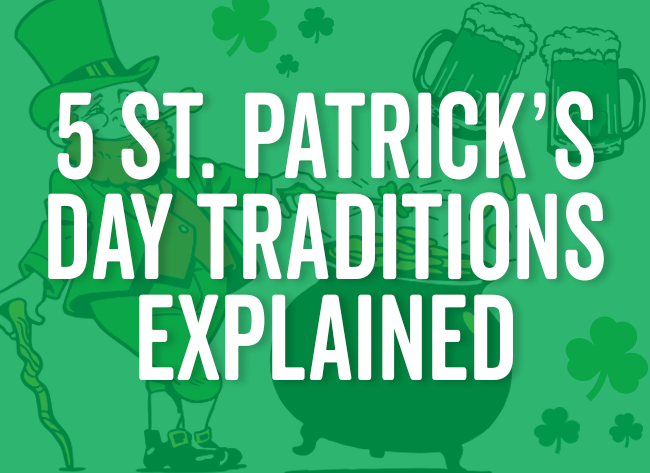5 St. Patrick’s Day Traditions Explained

Top ‘o the mornin’ to ya! St. Patrick’s Day is right around the corner, so get ready to break out your green duds and grab your drinking pals to celebrate the Irish culture. In case you’ve ever wondered why these strange St. Paddy’s Day traditions exist, we’ve taken a whack at explaining them below.
5 St. Patrick’s Day Traditions Explained
- Wear Green (Or you’ll get pinched!)
- Parades
- Beer, Lots and Lots of Beer
- Shamrocks
- Corned Beef and Cabbage
Believe it or not, St. Patrick himself was originally associated with the color blue. However, the color green is often linked with Irish Catholics, as well as Irelands nickname, ‘The Emerald Isle.’ As for the reason you’ll get pinched if you don’t don the color? Irish folklore says leprechauns can’t see green, so wearing the color makes you invisible to them. Myth says leprechauns pinched anyone who wasn’t wearing the color, so people continue to do so today in homage to the Irish mythical creature.
St. Patrick’s Day originated as a religious holiday, however, a wave of Irish immigrants in America quickly turned it into a giant celebration of their heritage. On March 17, 1762 the first ever recorded St. Patrick’s Day parade took place in New York City – it has been a tradition ever since!
Commonly, St. Patrick’s Day was celebrated with a large feast, where Christians were able to set aside their lent restrictions. Therefore, plenty of booze were consumed on this day. Although many people today may not know exactly why they are downing pints of green beer, the tradition has continued.
Some say that St. Patrick used the shamrock to depict the Holy Trinity (God the Father, Son, and Holy Spirit) in his religious teachings. In turn, the shamrock was traditionally worn as a religious symbol associated with the patron saint of Ireland. Nowadays, you can find everything from shamrock-shaped glasses, pins, and headbands to sport on March 17th. (By the way, as any Irishman will tell you, a shamrock is NOT the same as a four-leaf clover!)
Ever grub on some corned beef and cabbage on St. Paddy’s Day to bring you the luck of the Irish? Ultimately, this meal isn’t Irish at all. Early Irish immigrants could easily get their hands on corned beef, a meat very similar to their beloved salt pork (bacon), which was far too expensive in the U.S. As for the cabbage, it was a readily available and cheap vegetable for the immigrants. And there you have it, the dish stuck!
Is it St. Paddy’s or St. Patty’s? Don’t embarrass yourself by calling it St. Patty’s Day! Why? As PaddynotPatty.com explains, “Paddy” comes from the official Irish spelling “Pádraig,” not “Patty,” which is a woman’s name.
Do you and your family have any other fun (or weird!) St. Paddy’s Day traditions? Tell us about them below.


Leave a Comment